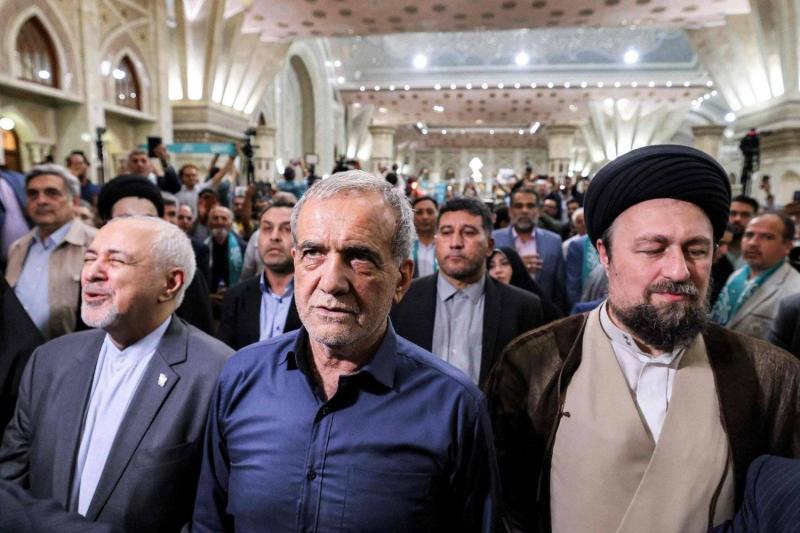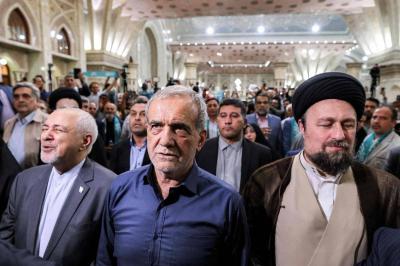The new Iranian President, Masoud Bazeshkian, has not clarified how he intends to implement a reform program in the Iranian "Islamic Republic" at a time when he is fully aware, even before becoming president, that the system refuses to recognize an opposition of any weight, influence, or role. Had Bazeshkian not enjoyed the approval of the "Supreme Leader" Ali Khamenei, he would not have ascended to the presidency. Such approval is the first and last condition for holding this position, especially since the "Leader" can prevent anyone he dislikes from even running for the presidency. The reality is that the man is a necessity for the regime at this time and, in addition, a need to give a misleading image of "moderate Iran" in a world poised for significant changes and a region in a state of turmoil.
In a lengthy article recently published in the "Tehran Times," Bazeshkian was keen to emphasize loyalty to Khamenei first. He stated: "In the midst of war and political turmoil in the region, the political system in Iran has demonstrated its stability through conducting elections in a competitive, peaceful, and organized manner, refuting the claims of some experts on Iranian affairs in certain governments, stressing that this political stability and the prideful manner of conducting elections affirms the insight of the Islamic Revolution's leader, Ayatollah Khamenei, and the devotion of the Iranian people to the democratic transition of power, even in difficult circumstances." It remains unclear what "democratic transition of power" he is referring to.
Bazeshkian also speaks about cooperation with other countries in the region and the world without any specific mention of the United States. He often states contradictory things, especially when discussing relations with the world and the nearby environment. For instance, he says: "We will initiate cooperation with Turkey, Saudi Arabia, Oman, Iraq, Bahrain, Qatar, Kuwait, the UAE, and regional organizations to deepen economic relations, enhance trade relations, increase joint investment, address common challenges, and move forward towards establishing a regional framework for dialogue, trust-building, and development. Our region has long suffered from war, sectarian tensions, terrorism, extremism, drug trafficking, water scarcity, refugee crises, environmental destruction, and foreign interventions, and the time has come to address the shared challenges among nations in the region for a better future for generations to come."
He argued that "cooperation for regional development and prosperity will be the guiding principle of our foreign policy." He affirmed that as countries with significant resources and shared beliefs rooted in the gentle teachings of Islam, we must unite and rely on the power of reason rather than the logic of force. He added: "By utilizing our capacities to establish a standard, we can play a crucial role in the emerging post-polar world by promoting peace, creating a conducive environment for sustainable development, enhancing dialogue, and dispelling anti-Islam sentiments." He further stated: "Iran is ready to do its fair share in this regard. I will work to stop the massacre in Gaza and prevent the war from expanding."
Among the most amusing points in Bazeshkian's article is his assertion that Tehran "will prioritize strengthening relations with our neighbors, working to establish a strong regional foundation instead of a region where one state seeks to impose its dominance and control over the others," expressing his belief that "neighboring and brotherly countries should not waste their precious resources in draining competitions, arms races, or unnecessarily restricting each other; instead, our goal should be to create an environment that allows countries to allocate their resources to achieve progress and development in the region for the benefit of all."
It would be beneficial for Bazeshkian to pose real questions directed primarily toward Iran itself and not to others about how to "waste precious resources," especially since the Iranian president's comments about "arms races" came in the context of his reference to the fact that "our region has long suffered from war, sectarian tensions, terrorism, extremism, drug trafficking (...)." Bazeshkian raised many pertinent questions that the "Islamic Republic" itself, before anyone else, needs to answer, starting with the activities of sectarian militias in Iraq, Syria, Lebanon, Yemen, and various regions of the world. It is not clear, of course, how the new Iranian president speaks so casually about "war, sectarian tensions, terrorism, extremism, and drug trafficking," as if the militias affiliated with the "Revolutionary Guard" are combating these phenomena while, in reality, they encourage them...!
For the words of the new Iranian president to be taken seriously, he needs to return to reality. As long as he is unable to make such a return, his statements remain merely beautiful words. It is easy to come up with such beautiful rhetoric, but convincing any country in the region of it is much more difficult. To put it more clearly, the Arab peoples know well what Iran is doing in the region and the nature of the relationship between the "Islamic Republic" and a minority regime like that in Syria, which has been waging war against its people for over 13 years. Is Iran, through its militias, participating in this war to serve stability in the region or because it supports a regime it believes is an ally, a regime willing to employ all forms of repression to forcibly displace as many of its citizens from Syrian territory?
Notably, in the article published by Bazeshkian, there was no mention of Lebanon. Did he ask himself what the "Islamic Republic" is doing in Lebanon and the nature of the actions of its affiliated party on the ground since this party's inception in the early 1980s... leading up to the opening of the southern Lebanon front?
True change in Iran, grounded reforms, and a positive role for this country regionally can only occur when real questions are raised in Tehran instead of the ludicrous and pitiable talk of a "democratic transition of power."




